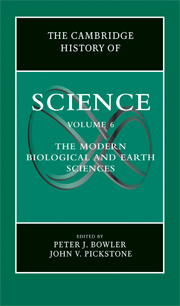Book contents
- Frontmatter
- 1 Introduction
- PART I WORKERS AND PLACES
- 2 Amateurs and Professionals
- 3 Discovery and Exploration
- 4 Museums
- 5 Field Stations and Surveys
- 6 Universities
- 7 Geological Industries
- 8 The Pharmaceutical Industries
- 9 Public and Environmental Health
- PART II ANALYSIS AND EXPERIMENTATION
- PART III NEW OBJECTS AND IDEAS
- PART IV SCIENCE AND CULTURE
- Index
- References
7 - Geological Industries
from PART I - WORKERS AND PLACES
Published online by Cambridge University Press: 28 November 2009
- Frontmatter
- 1 Introduction
- PART I WORKERS AND PLACES
- 2 Amateurs and Professionals
- 3 Discovery and Exploration
- 4 Museums
- 5 Field Stations and Surveys
- 6 Universities
- 7 Geological Industries
- 8 The Pharmaceutical Industries
- 9 Public and Environmental Health
- PART II ANALYSIS AND EXPERIMENTATION
- PART III NEW OBJECTS AND IDEAS
- PART IV SCIENCE AND CULTURE
- Index
- References
Summary
The relation between geology and industry remains a significant, challenging, yet overlooked topic within the history of the earth sciences. Anyone surveying the subject confronts the glaring fact that very little has been written on it either by historians or geologists themselves. Industry is nevertheless important to understanding the history of geology if for no other reason than the tremendous amount of research that scientists (and engineers) have done on mineral resources. It would have been difficult to find a prominent nineteenth- or twentieth-century geologist who was unfamiliar with coal, petroleum, iron, copper, silver, or gold, not to mention building stones, water, and salt. Practically every textbook had some description of the origin and occurrence of useful minerals, whether the author was studying them or not. On the surface, economic resources seem to occupy a central place in geology, but explaining industry’s influence on the development of the science is another matter entirely.
This chapter addresses the relation between geology and industry from four perspectives: mining schools, government surveys, private surveys, and industrial science. The first two sections discuss institutions that served as intermediaries between science and commerce. The third section addresses the settings and conditions in which geologists worked directly for private enterprise, and the last section treats the emergence of new research fields that industry encouraged. This analytical framework follows a rough chronology, beginning in the late eighteenth century and ending in the mid-twentieth, which itself reveals the increasing influence of industry on geology.
- Type
- Chapter
- Information
- The Cambridge History of Science , pp. 108 - 125Publisher: Cambridge University PressPrint publication year: 2009
References
- 1
- Cited by



